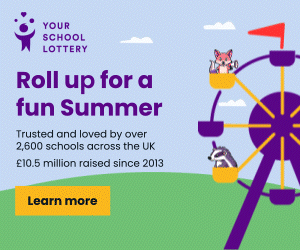Being tasked with sourcing raffle prizes can be hard work. Be prepared for refusals along the way, but a clear action plan and a positive approach should see you through.
When to start asking
Allow more time than you think you will need. You might feel uncomfortable asking for raffle prizes, but you’re not alone. Start slowly by contacting people who’ve donated in previous years. Once you get a few goodies under your belt, your confidence will grow.
Who to ask
Make the most of your contacts: ask parents, governors, current sponsors and previous donors. Then widen the net to include local businesses, attractions and sports clubs. Get creative: who might live or work in your area but isn’t an obvious choice for a donation? Is there a new cafe or cinema that would like to promote their business to families? Some PTAs include a raffle donation as part of the charge for external stallholders.
‘As we’re a brand-new PTA with no business contacts, previous prize donors or money in the bank, we wanted to keep our raffle as simple as possible. Each class was allocated a theme and a letter went home to parents requesting donations based around the theme. The parents gave us such lovely things, and the PTA created hampers using a cardboard box wrapped in cellophane and tied with a bow. There was a hamper filled with chocolate gifts, one full of pamper products, an arts and crafts hamper, and many more. The raffle was really popular, and we raised £928.’
Emily Moorhouse, Handcross Primary School PTA, West Sussex (240 pupils)
How to ask
Choose a day when you’re feeling particularly confident and take a stroll down your local high street. If you find this really intimidating then put a time limit on it. Those 20 minutes of your life will be over pretty quickly, and after that you probably won’t mind doing another 20. If you’re visiting shops, pick a time when you would expect them to be quiet. If it’s is really busy when you get there, try again another day. Read our tips on writing letters to businesses and download a template letter.
‘It helps to have a letter on headed paper to hand to potential donors. Just go in, say you are asking for prizes for a raffle for your child’s school. Explain how a donation would allow them to advertise within the school community, and tell them how many children or families are in the school. Explain what the money raised would be going towards and let them know that anything they can offer would be amazing. Ask to speak to the manager as they are the one who will make the decision. Once you’ve been to a few places and secured some donations, it helps with confidence. Now I’m firmly in the “if you don’t ask you don’t get” camp – and I’ll ask absolutely anyone!’
Sarah Wesley, treasurer, Friends of South Camberley Primary & Nursery School, Camberley, Surrey (757 pupils)
Local and national
Contact local and national companies via email, Facebook or X (formerly Twitter). Find out the name of the right person to approach and use it. Try posting a request for raffle prizes on local Facebook pages and groups. If you’re fundraising for something specific, it’s a good idea to mention this and list the benefits for pupils.
Don’t be afraid to follow up your email, X post or letter. Be polite. If you don’t hear anything after two attempts they probably aren’t interested, so leave it there and try someone else. If you are offered a donation, reply quickly and say thank you. Once the fair is over and the raffle has been drawn, contact donors again with another thank you and a note to say how much the raffle raised for your cause.
One-off prize
While the most obvious raffle prizes are items donated by local retail and manufacturing companies, it’s also good to think outside the box. Items and experiences that can’t be bought ‘off the shelf’ make extra-special raffle prizes and will have visitors queuing up to win. Do any of the parents own anything as luxurious as a holiday cottage they would offer for a week? Are there any creative parents who would be prepared to produce a piece of artwork?
If this really doesn’t sound like your community, how about a couple of hours’ cleaning or gardening? Or can the best baker on the PTA offer to bake a special cake? Are any of your parents personal trainers, yoga instructors or mobile beauticians? Donating a voucher is an easy way for them to drum up new business. By the time of the draw, you should have a selection of different prizes that will appeal to all. Remember, the more prizes, the greater the chance of winning for each ticket purchased.
- Raffle tips and advice
- Find raffle ticket suppliers in our online directory
Buy a prize
If, despite your best efforts, you still don’t have a main prize to drive ticket sales, consider buying something special or offering a cash prize. How much you are able to spend depends on what type of raffle you are running. The rules set out by the Gambling Commission allow for some of the proceeds of each kind of raffle to be spent on prizes: for an ‘incidental lottery’ (tickets are only sold on the day and the draw is made at the event, or shortly after) up to £500 of the raffle takings may be used to buy prizes. If you’re running a ‘small society lottery’ (tickets can be sold before the event and you must register with your local authority) you may use up to 80% of takings for prizes.
Of course, spending money on prizes will reduce your profits on the day, so aim to sell enough tickets to cover the extra outgoings. Visit the Gambling Commission for more details on different types of raffle.
If no one wants to take on sole responsibility for raffle prizes, split the task between several people or ask every committee member to commit to getting two or three prizes each. Good communication is required so that you don’t all ask the same people.
A few refusals are perfectly normal and not everyone will be in a position to help you. However, if you think too many people are saying no, see if you can tweak your request to emphasise the emotional and beneficial aspects of your fundraising.
On the day
Make sure all your volunteers know what big-ticket prizes you have on offer, where tickets are being sold and what they cost. Sell tickets on the door and have a few volunteers selling as people walk around.
Include a list of prizes in your programme, if you have one, and display them clearly on the door. Or laminate an A4 sheet for visitors to pass around. Make sure you’ve included any company logos or contact details you have promised and that everything is spelled correctly.







.gif)

